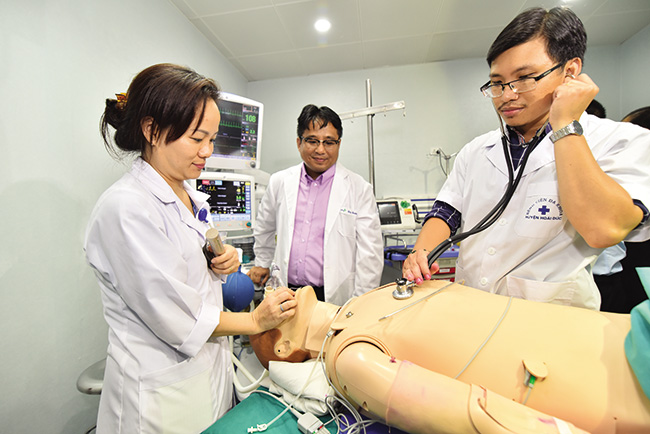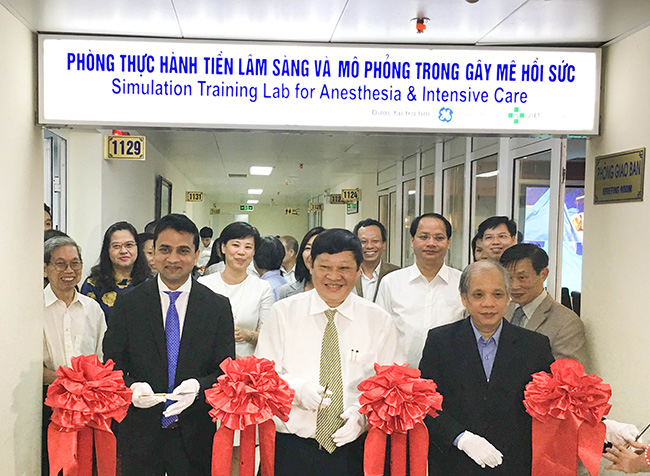GE Healthcare training for the future
 |
| Vietnamese medical professional training in the use of GE Healthcare’s innovative technologies |
The implications of these statistics are significant given that the population of emerging markets is on a steady trend of growth, and sustainable healthcare is not possible without adequately trained and skilled workforce.
The same holds true in Vietnam. While Vietnam spends relatively more on healthcare than its neighbours, Vietnam’s GDP to healthcare expenditure ratio is about 7.1 per cent, compared to Singapore’s 4.9 per cent and the Philippines’ 4.7 per cent, the country’s healthcare system faces significant challenges and lags behind in both accessibility and quality, according to the World Bank’s data.
As the Vietnamese government looks to expand coverage and access to quality healthcare to all, it is taking proactive steps to address these issues. The Ministry of Health (MoH)’s Five-Year Health Sector Development Plan 2011-2015 identified that a “responsive, fair and efficient” workforce is essential in the country’s healthcare system.
For this reason, GE Healthcare, in partnership with the MoH, local healthcare providers, and educational institutions, have been working to develop and grow the country’s healthcare workforce.
 |
| The opening of the Simulation Training Lab for Anesthesia and Intensive Care at Viet Duc Hospital |
Viet Duc Simulation Training Lab for Anesthesia and Intensive Care
GE Healthcare is committed to capacity-building and investment into local communities it operates in. One of the ways GE Healthcare contributes to strengthening healthcare systems globally is the training and education of healthcare professionals. By equipping local talent with training and expertise on medical procedures and safe surgery, GE Healthcare is empowering local clinicians to raise the standards of healthcare from the bottom up, and drive greater positive health outcomes in their countries.
GE Healthcare, along with the Vietnam Society of Anaesthesiologists (VSA), Viet Duc Hospital and Viet Medical, last week announced the opening of the Simulation Training Lab for Anesthesia and Intensive Care, aimed at improving education and raising awareness on the importance of safe anaesthesia administration in Vietnam.
In partnership with local stakeholders, GE Healthcare was able to identify and address an existing challenge of the Vietnamese healthcare system: the need for more and better trained anaesthesiologists. In today’s Vietnam, there is one anaesthesia provider for every 134,434 people. In comparison, the neighbouring Singapore has one for 22,140 people, and the Philippines has one for 40,875 people, according to the MoH’s statistics.
As one of the largest surgical and teaching hospitals in Vietnam, the new simulation training lab at Viet Duc Hospital will provide training for up to 400 anaesthesia students and trainees from across the country each year.
“In Vietnam, rarely do we see students and trainees have the opportunity to go through real life simulation, to observe, learn from, and improve before facing such crisis in a fast-paced environment, such as the Simulation Training Lab for Anesthesia and Intensive Care. I truly believe this is a huge step in raising the standards of anaesthesia administration and patient care in Vietnam,” said Associate Professor PhD Cong Quyet Thang, chairman of the VSA.
Currently, the Simulation Training Lab for Anesthesia and Intensive Care is open for enrolment for Viet Duc Hospital trainees and VSA members, while planning to eventually extend training to anaesthesiology students and trainees across Vietnam and the ASEAN.
“GE Healthcare is committed not only to providing innovative technologies and machines for Vietnam, but also the education and training behind them to ensure healthcare providers are able to give the very best care to their patients,” said Nilesh Shah, general manager of Life Care Solutions at GE Healthcare Asia Pacific.
Global commitment realised in Vietnam
In addition to Simulation Training Lab for Anesthesia and Intensive Care at Viet Duc Hospital, GE Healthcare has made a number of significant investments to enhance training and education in Vietnam. In March, 2015, GE Healthcare signed a Memorandum of Understanding (MoU) with Bach Mai Hospital in Hanoi to introduce a new education programme handing over $250,000 in patient monitors to help train Vietnamese clinicians on how to better utilise the machinery to improve patient care, especially in the Emergency Department and Intensive Care Unit.
As one of the biggest teaching hospitals in Vietnam, Bach Mai plays a large role in the education and training of much of Vietnam’s healthcare workforce, nearly 2,000 clinicians a year receive various kinds of medical training at Bach Mai, including medical students, post graduates, and clinicians participating in advanced education programmes.
Additionally, in April 2015, GE Healthcare and the Vietnam National Heart Institute co-hosted a cardiac medical education seminar for Vietnamese physicians, aimed at improving the diagnosis rate and treatment of cardiovascular diseases in Vietnam. More than 100 physicians travelled to the National Heart Institute in Hanoi to attend the full day seminar and hands-on training demonstration of GE’s ultrasound solutions, Vivid S6 and Vivid T8.
Globally, GE Healthcare has committed to investing $1 billion worldwide by 2020 in the development and delivery of localised healthcare education. Investing in the education and training of healthcare professionals is one of the greatest enablers of sustainable healthcare development. With such programmes at Viet Duc and Bach Mai hospitals, and the National Heart Institute, GE Healthcare hopes to play even a small part in building a sustainable and safe healthcare system in Vietnam and ensure that the country’s nearly 93 million people have access to quality healthcare.
What the stars mean:
★ Poor ★ ★ Promising ★★★ Good ★★★★ Very good ★★★★★ Exceptional
Latest News
More News
- Addressing Vietnam's energy challenges with aeroderivative gas turbines (February 28, 2023 | 09:33)
- How to sprint ahead in 2023’s worldwide energy priorities (February 08, 2023 | 13:55)
- Boosting Vietnam's grid stability through gas turbine technology (November 22, 2022 | 20:02)
- Healthcare trio collaborates to provide thousands of free breast scans (October 27, 2022 | 17:19)
- GE Healthcare's vision for AI-backed radiology (September 29, 2022 | 11:53)
- GE brand trio to shape the future of key industries (July 19, 2022 | 15:35)
- GE unveiling brand names and defining future (July 19, 2022 | 15:16)
- GE: the shortest route towards sustainability (July 18, 2022 | 08:00)
- Be proactive in an uncertain world (May 20, 2022 | 11:40)
- GE secures first 9HA combined cycle power plant order in Vietnam (May 16, 2022 | 17:06)

















 Mobile Version
Mobile Version